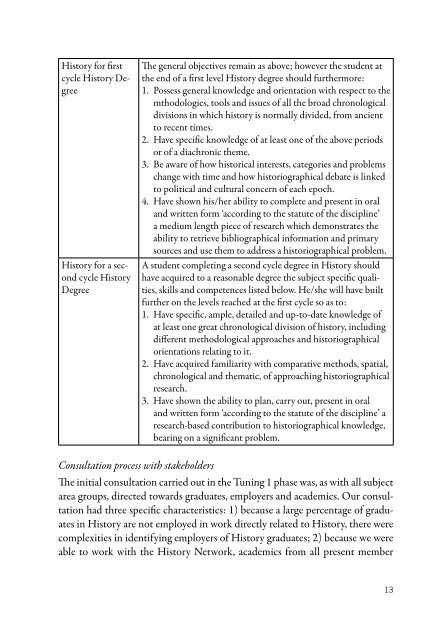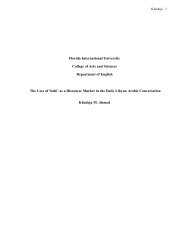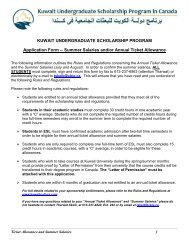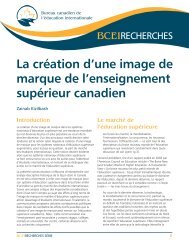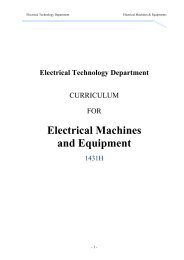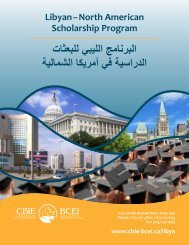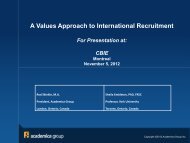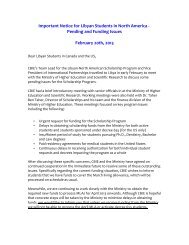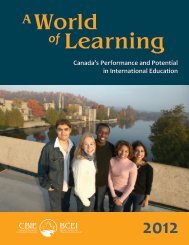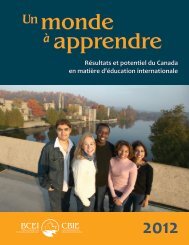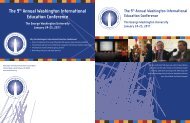Creating a New Historical Perspective: EU and the Wider World ...
Creating a New Historical Perspective: EU and the Wider World ...
Creating a New Historical Perspective: EU and the Wider World ...
Create successful ePaper yourself
Turn your PDF publications into a flip-book with our unique Google optimized e-Paper software.
History for first<br />
cycle History Degree<br />
History for a second<br />
cycle History<br />
Degree<br />
The general objectives remain as above; however <strong>the</strong> student at<br />
<strong>the</strong> end of a first level History degree should fur<strong>the</strong>rmore:<br />
1. Possess general knowledge <strong>and</strong> orientation with respect to <strong>the</strong><br />
mthodologies, tools <strong>and</strong> issues of all <strong>the</strong> broad chronological<br />
divisions in which history is normally divided, from ancient<br />
to recent times.<br />
2. Have specific knowledge of at least one of <strong>the</strong> above periods<br />
or of a diachronic <strong>the</strong>me.<br />
3. Be aware of how historical interests, categories <strong>and</strong> problems<br />
change with time <strong>and</strong> how historiographical debate is linked<br />
to political <strong>and</strong> cultural concern of each epoch.<br />
4. Have shown his/her ability to complete <strong>and</strong> present in oral<br />
<strong>and</strong> written form ‘according to <strong>the</strong> statute of <strong>the</strong> discipline’<br />
a medium length piece of research which demonstrates <strong>the</strong><br />
ability to retrieve bibliographical information <strong>and</strong> primary<br />
sources <strong>and</strong> use <strong>the</strong>m to address a historiographical problem.<br />
A student completing a second cycle degree in History should<br />
have acquired to a reasonable degree <strong>the</strong> subject specific qualities,<br />
skills <strong>and</strong> competences listed below. He/she will have built<br />
fur<strong>the</strong>r on <strong>the</strong> levels reached at <strong>the</strong> first cycle so as to:<br />
1. Have specific, ample, detailed <strong>and</strong> up-to-date knowledge of<br />
at least one great chronological division of history, including<br />
different methodological approaches <strong>and</strong> historiographical<br />
orientations relating to it.<br />
2. Have acquired familiarity with comparative methods, spatial,<br />
chronological <strong>and</strong> <strong>the</strong>matic, of approaching historiographical<br />
research.<br />
3. Have shown <strong>the</strong> ability to plan, carry out, present in oral<br />
<strong>and</strong> written form ‘according to <strong>the</strong> statute of <strong>the</strong> discipline’ a<br />
research-based contribution to historiographical knowledge,<br />
bearing on a significant problem.<br />
Consultation process with stakeholders<br />
The initial consultation carried out in <strong>the</strong> Tuning 1 phase was, as with all subject<br />
area groups, directed towards graduates, employers <strong>and</strong> academics. Our consultation<br />
had three specific characteristics: 1) because a large percentage of graduates<br />
in History are not employed in work directly related to History, <strong>the</strong>re were<br />
complexities in identifying employers of History graduates; 2) because we were<br />
able to work with <strong>the</strong> History Network, academics from all present member<br />
13


